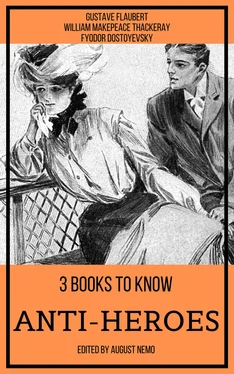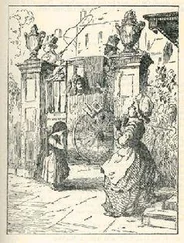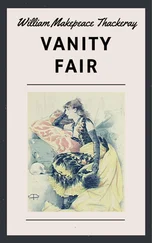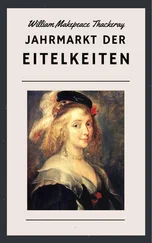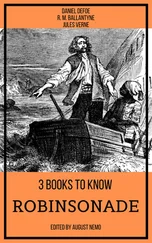Her Ladyship and I lived, after a while, pretty separate when in London. She preferred quiet: or to say the truth, I preferred it; being a great friend to a modest tranquil behaviour in woman, and a taste for the domestic pleasures. Hence I encouraged her to dine at home with her ladies, her chaplain, and a few of her friends; admitted three or four proper and discreet persons to accompany her to her box at the opera or play on proper occasions; and indeed declined for her the too frequent visits of her friends and family, preferring to receive them only twice or thrice in a season on our grand reception days. Besides, she was a mother, and had great comfort in the dressing, educating, and dandling our little Bryan, for whose sake it was fit that she should give up the pleasures and frivolities of the world; so she left THAT part of the duty of every family of distinction to be performed by me. To say the truth, Lady Lyndon’s figure and appearance were not at this time such as to make for their owner any very brilliant appearance in the fashionable world. She had grown very fat, was short-sighted, pale in complexion, careless about her dress, dull in demeanour; her conversations with me characterised by a stupid despair, or a silly blundering attempt at forced cheerfulness still more disagreeable: hence our intercourse was but trifling, and my temptations to carry her into the world, or to remain in her society, of necessity exceedingly small. She would try my temper at home, too, in a thousand ways. When requested by me (often, I own, rather roughly) to entertain the company with conversation, wit, and learning, of which she was a mistress: or music, of which she was an accomplished performer, she would as often as not begin to cry, and leave the room. My company from this, of course, fancied I was a tyrant over her; whereas I was only a severe and careful guardian over a silly, bad-tempered, and weak-minded lady.
She was luckily very fond of her youngest son, and through him I had a wholesome and effectual hold of her; for if in any of her tantrums or fits of haughtiness—(this woman was intolerably proud; and repeatedly, at first, in our quarrels, dared to twit me with my own original poverty and low birth),—if, I say, in our disputes she pretended to have the upper hand, to assert her authority against mine, to refuse to sign such papers as I might think necessary for the distribution of our large and complicated property, I would have Master Bryan carried off to Chiswick for a couple of days; and I warrant me his lady-mother could hold out no longer, and would agree to anything I chose to propose. The servants about her I took care should be in my pay, not hers: especially the child’s head nurse was under MY orders, not those of my lady; and a very handsome, red-cheeked, impudent jade she was; and a great fool she made me make of myself. This woman was more mistress of the house than the poor-spirited lady who owned it. She gave the law to the servants; and if I showed any particular attention to any of the ladies who visited us, the slut would not scruple to show her jealousy, and to find means to send them packing. The fact is, a generous man is always made a fool of by some woman or other, and this one had such an influence over me that she could turn me round her finger. [Footnote: From these curious confessions, it would appear that Mr. Lyndon maltreated his lady in every possible way; that he denied her society, bullied her into signing away her property, spent it in gambling and taverns, was openly unfaithful to her; and, when she complained, threatened to remove her children from her. Nor, indeed, is he the only husband who has done the like, and has passed for ‘nobody’s enemy but his own:’ a jovial good-natured fellow. The world contains scores of such amiable people; and, indeed, it is because justice has not been done them that we have edited this autobiography. Had it been that of a mere hero of romance—one of those heroic youths who figure in the novels of Scott and James—there would have been no call to introduce the reader to a personage already so often and so charmingly depicted. Mr. Barry Lyndon is not, we repeat, a hero of the common pattern; but let the reader look round, and ask himself, Do not as many rogues succeed in life as honest men? more fools than men of talent? And is it not just that the lives of this class should be described by the student of human nature as well as the actions of those fairy-tale princes, those perfect impossible heroes, whom our writers love to describe? There is something naive and simple in that time-honoured style of novel-writing by which Prince Prettyman, at the end of his adventures, is put in possession of every worldly prosperity, as he has been endowed with every mental and bodily excellence previously. The novelist thinks that he can do no more for his darling hero than make him a lord. Is it not a poor standard that, of the summum bonum? The greatest good in life is not to be a lord; perhaps not even to be happy. Poverty, illness, a humpback, may be rewards and conditions of good, as well as that bodily prosperity which all of us unconsciously set up for worship. But this is a subject for an essay, not a note; and it is best to allow Mr. Lyndon to resume the candid and ingenious narrative of his virtues and defects.]
Her infernal temper (Mrs. Stammer was the jade’s name) and my wife’s moody despondency, made my house and home not over-pleasant: hence I was driven a good deal abroad, where, as play was the fashion at every club, tavern, and assembly, I, of course, was obliged to resume my old habit, and to commence as an amateur those games at which I was once unrivalled in Europe. But whether a man’s temper changes with prosperity, or his skill leaves him when, deprived of a confederate, and pursuing the game no longer professionally, he joins in it, like the rest of the world, for pastime, I know not; but certain it is, that in the seasons of 1774-75 I lost much money at ‘White’s’ and the ‘Cocoa-Tree,’ and was compelled to meet my losses by borrowing largely upon my wife’s annuities, insuring her Ladyship’s life, and so forth. The terms at which I raised these necessary sums and the outlays requisite for my improvements were, of course, very onerous, and clipped the property considerably; and it was some of these papers which my Lady Lyndon (who was of a narrow, timid, and stingy turn) occasionally refused to sign: until I PERSUADED her, as I have before shown.
My dealings on the turf ought to be mentioned, as forming part of my history at this time; but, in truth, I have no particular pleasure in recalling my Newmarket doings. I was infernally bit and bubbled in almost every one of my transactions there; and though I could ride a horse as well as any man in England, was no match with the English noblemen at backing him. Fifteen years after my horse, Bay Bulow, by Sophy Hardcastle, out of Eclipse, lost the Newmarket stakes, for which he was the first favourite, I found that a noble earl, who shall be nameless, had got into his stable the morning before he ran; and the consequence was that an outside horse won, and your humble servant was out to the amount of fifteen thousand pounds. Strangers had no chance in those days on the heath: and, though dazzled by the splendour and fashion assembled there, and surrounded by the greatest persons of the land,—the royal dukes, with their wives and splendid equipages; old Grafton, with his queer bevy of company, and such men as Ancaster, Sandwich, Lorn,—a man might have considered himself certain of fair play and have been not a little proud of the society he kept; yet, I promise you, that, exalted as it was, there was no set of men in Europe who knew how to rob more genteelly, to bubble a stranger, to bribe a jockey, to doctor a horse, or to arrange a betting-book. Even I couldn’t stand against these accomplished gamesters of the highest families in Europe. Was it my own want of style, or my want of fortune? I know not. But now I was arrived at the height of my ambition, both my skill and my luck seemed to be deserting me. Everything I touched crumbled in my hand; every speculation I had failed, every agent I trusted deceived me. I am, indeed, one of those born to make, and not to keep fortunes; for the qualities and energy which lead a man to effect the first are often the very causes of his ruin in the latter case: indeed, I know of no other reason for the misfortunes which finally befell me. [Footnote: The Memoirs seem to have been written about the year 1814, in that calm retreat which Fortune had selected for the author at the close of his life.]
Читать дальше
